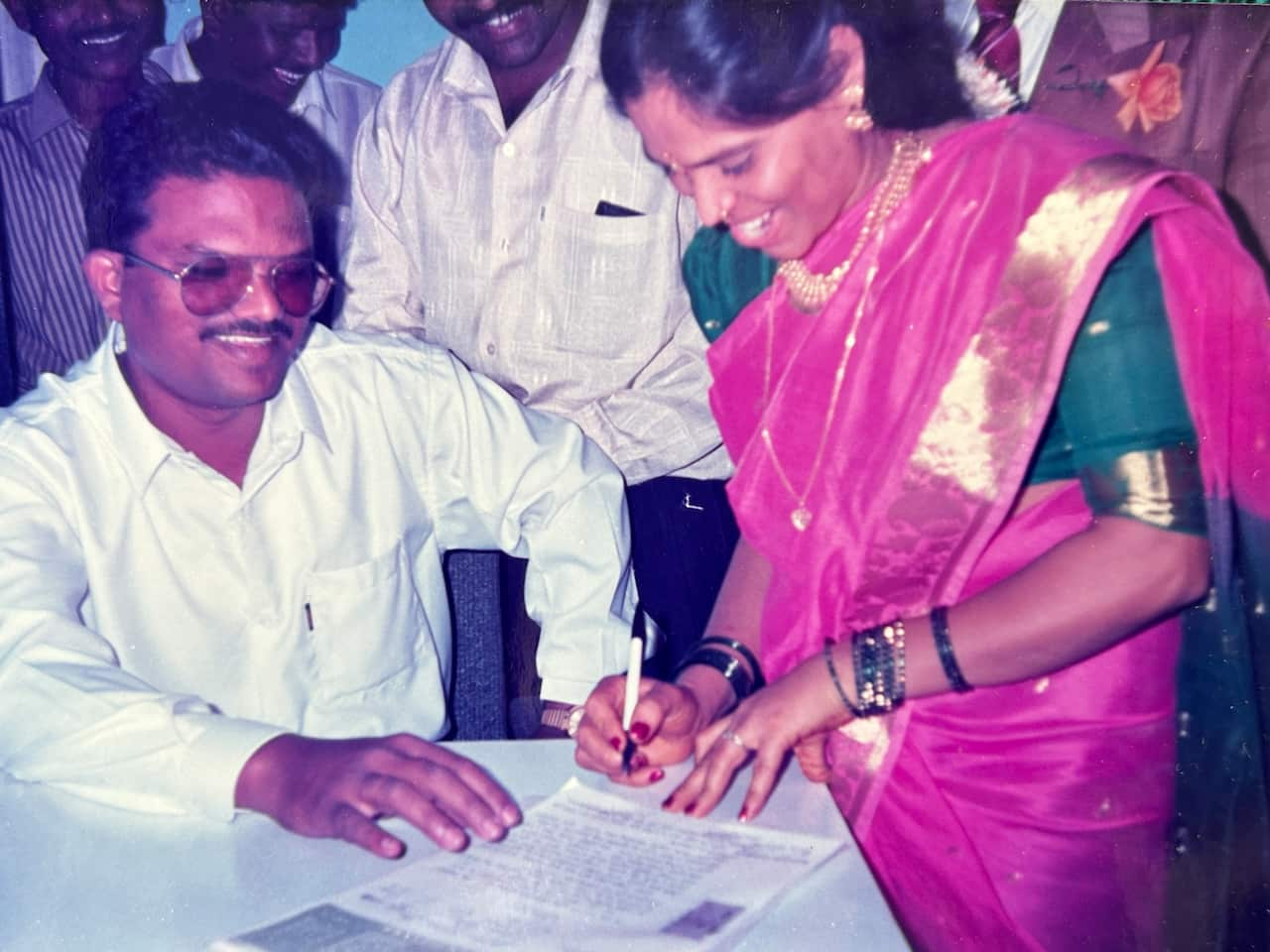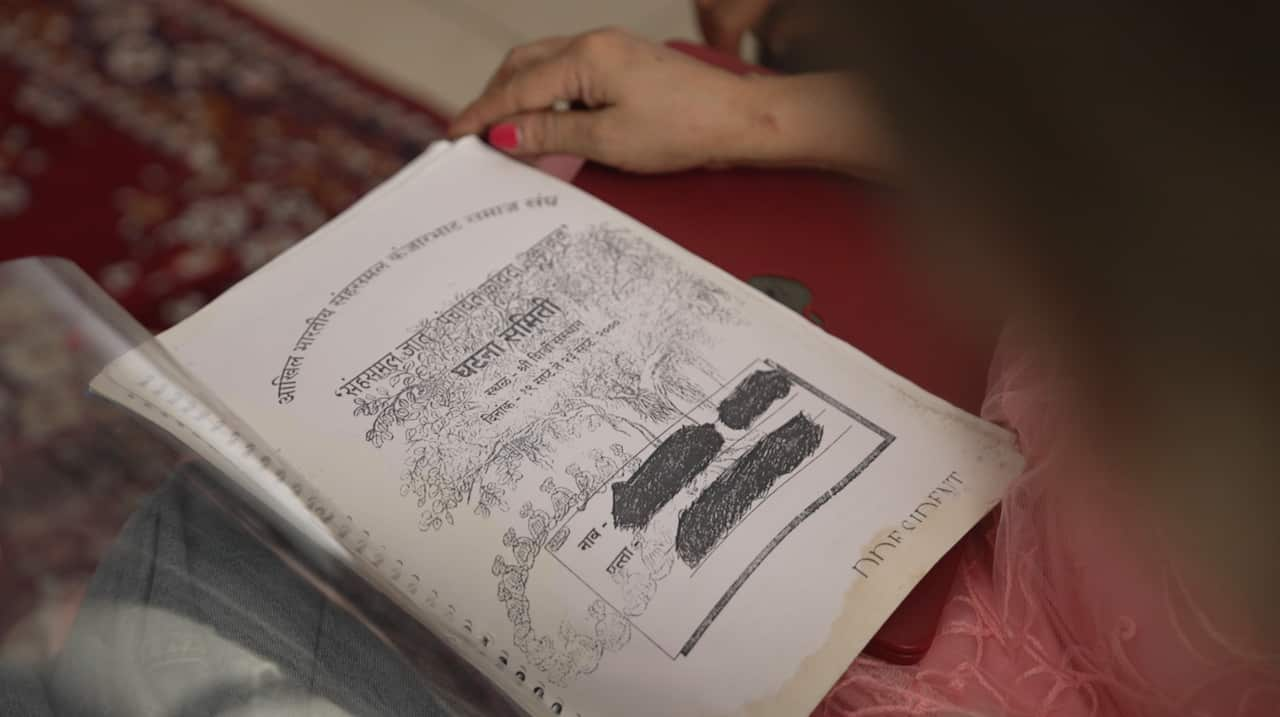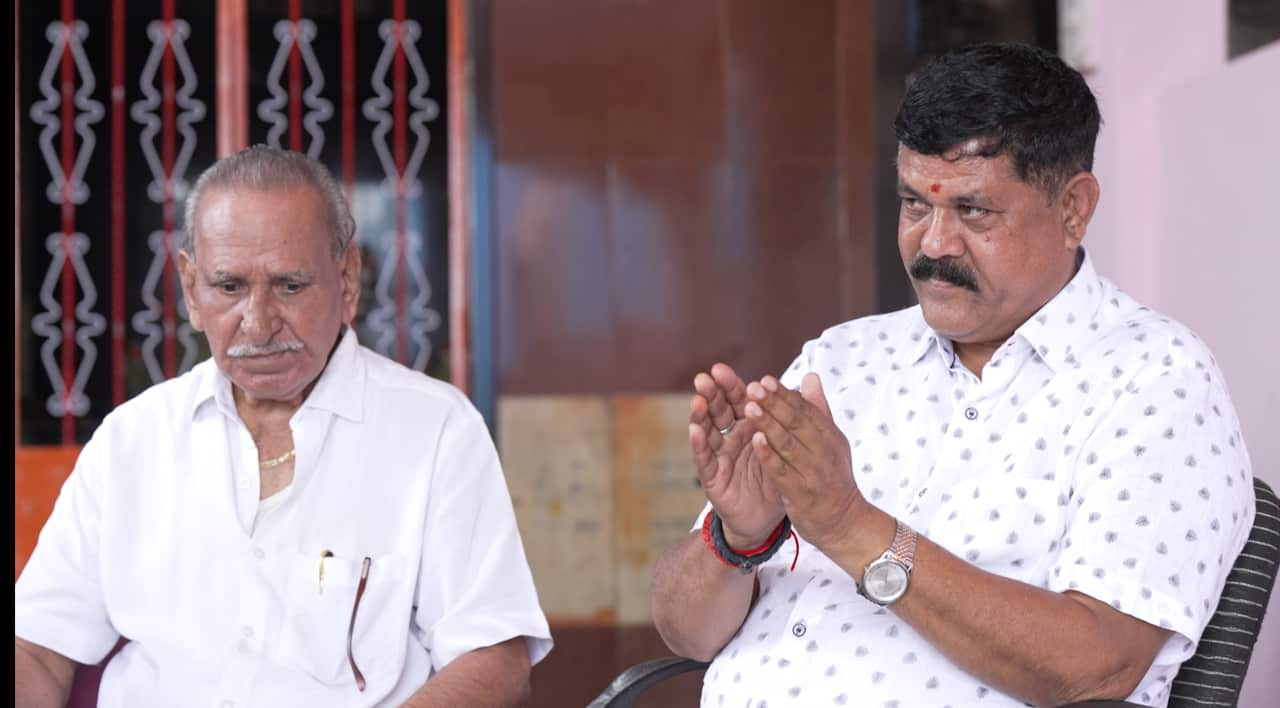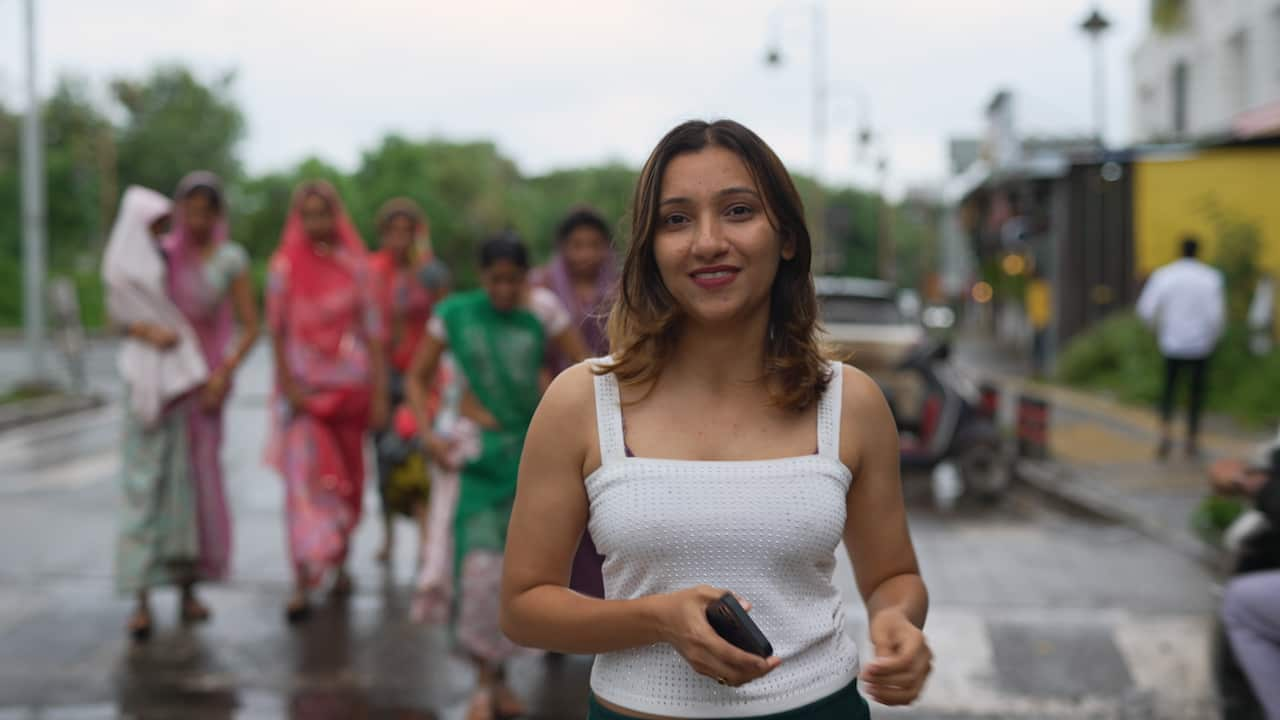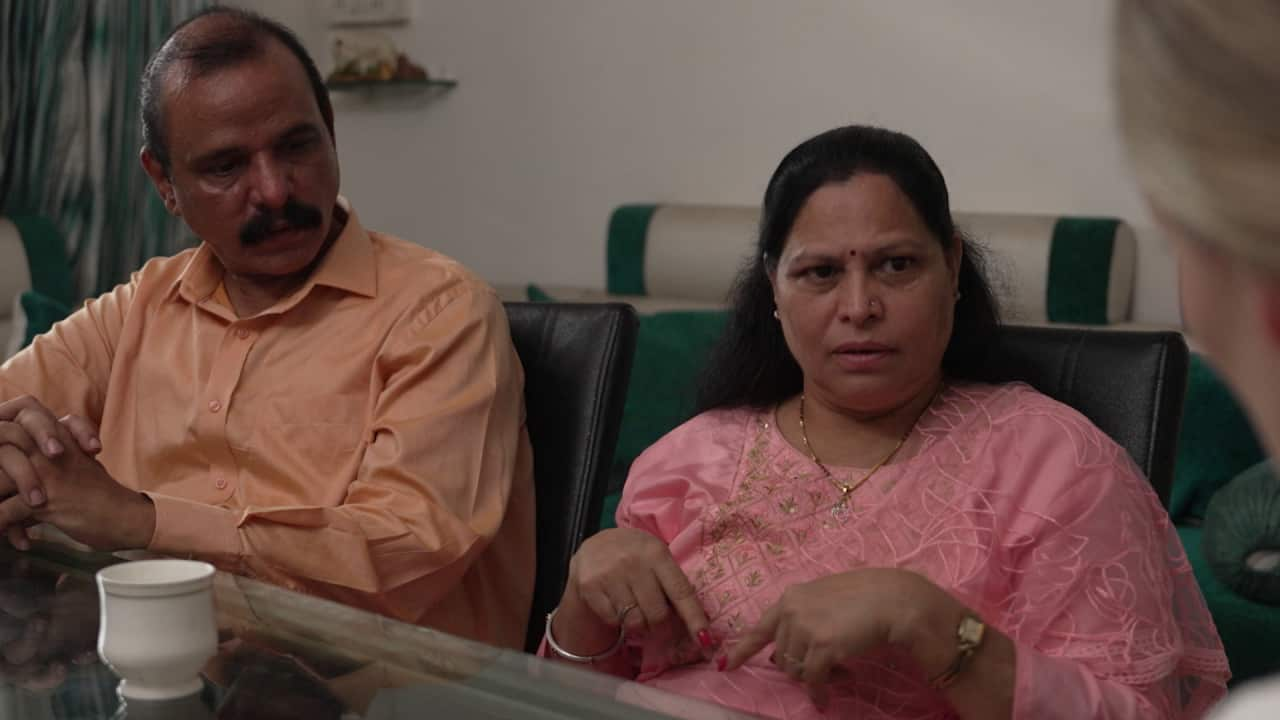Watch India’s Virginity Test on Tuesday 3 September at 9:30 pm on SBS or on
Krishna and Aruna Indrekar’s wedding was an act of defiance.
Foregoing the lavish ceremonies that are customary in their community, photos of their wedding day depict a modest registry wedding. Aruna, in a simple saree, signs a marriage certificate.
“[In our community] on the wedding day, a girl is very happy, thinking about her husband and her life after marriage,” Aruna said.
“But all her dreams are shattered when everyone starts talking about the virginity test.
“The only thing that matters is if the girl is a virgin or not. A girl’s happiness does not matter.”
Krishna said: “I decided that I will not put my wife through this.”
Aruna Indrekar wears a simple saree on her wedding day, in a radical act of defiance against the Kanjarbhat community traditions and its ritual of virginity testing.
Testing for ‘purity’
Members of an Indian community called the Kanjarbhats, Aruna and Krishna are fighting to end an archaic ritual of virginity testing, which they say is still carried out in the community on couples’ wedding nights.
They say the tests are humiliating and degrading and can result in trauma and abuse.
“Right after the marriage, the newlyweds are sent to a room for intercourse,” Krishna said.
“When the girl enters the room, all her clothes and any piece of jewellery are taken off … and she’s checked thoroughly for any sharp object that could scratch the skin and cause bleeding.
“The family hands the boy a white sheet to spread under them while they have sex so the sheet gets spotted with blood. And if the girl is a virgin, there should be red spots on the bedsheet. The girl will bleed.
“When the couple are done, they ask those waiting outside to come in the room and check.”
If the girl ‘passes’ the virginity test, she is declared pure by a council of Kanjarbhat community elders. If not, she is declared impure and can be subjected to severe punishment, including fines, physical abuse and social exile.
“The husband shouldn’t need to prove his wife’s virginity to the community. This practice violates their privacy. That’s why we kept the details of our wedding night to ourselves,” Krishna said.
A ‘black book’ of rituals
The Kanjarbhats are a formerly nomadic community from the northwest Indian state of Rajasthan who were once branded criminals at birth by the British.
In the years since, the Kanjarbhats have settled mostly in urban and semi-urban areas of Maharashtra, Gujarat and Karnataka. There are also Kanjarbhat populations outside India, in countries including Australia.
But the community still holds on to many of its old practices, including the ‘virginity test’.
The community’s rituals and traditions, once passed orally between generations, were compiled into a book by community elders in 2000.
“It’s called the “black book” in our community,” Krishna Indrekar said.
Pages from the Kanjarbhat community’s “constitution” which outlines the community’s rituals and rules, including the virginity test.
“Just like the constitution of a country, members of our community have made a constitution for our community.
“Section 38 in the book spells out the virginity test.”
The Indrekars say the enforcers and adjudicators of the virginity test are so-called caste councils, or jaat panchayats.
Unique to India’s various tribal communities, these all-male bodies see themselves as protectors of tradition, to ensure their community’s survival.
But they maintain a powerful and conservative grip that can sometimes challenge the law of the land.
Members of one caste council based in Pune, Maharashtra, told Dateline virginity tests are essential to the survival of the Kanjarbhat community.
“Yes, it should continue,” caste council elder Murchand Bhat said.
“Because of this test, there’s a fear in girls within our community that they should not engage in pre-marital sex or do anything to bring dishonour to their families. That’s why we fully support this tradition and it should continue.
“This tradition restricts girls from crossing any moral boundaries. In 99 per cent of cases, our girls stay virgins before marriage because of this tradition.
“It is, in fact, good for the community.”
Members of a Kanjarbhat community caste council in Pune, speak to Dateline reporter Calliste Weitenberg.
The caste council members say the test isn’t mandatory and is a choice made within the family. They also say it doesn’t violate a girl’s right to privacy, which is enshrined as a fundamental right under Article 21 of the Indian Constitution.
“The virginity test is neither performed in front of anyone, nor it will be performed,” Manoj Machare, another elder from Pune’s caste council said.
“All the traditions and customs are within the boundaries of [the Kanjarbhat] community. Our community still exists because of our traditions and customs. Every community exists because of its specific traditions and customs.”
They say they will not stop the practice until the entire community wants to.
The United Nations (UN) and the World Health Organization (WHO) called for a worldwide ban on ‘virginity testing’ in 2018.
In a joint statement, the UN and WHO said the concept of ‘virginity’ is a “social, cultural and religious construct – one that reflects gender discrimination against women and girls.”
The WHO states that there is no evidence that methods of ‘virginity testing’ can prove whether a woman or girl has had vaginal intercourse or not.
Speaking out despite rejection
A new generation of Kanjarbhat men and women are taking to social media to say no to the virginity tests and standing up to India’s caste councils.
“There are girls, there are in fact boys who are against these rituals, but they don’t have any platform to speak about it, to talk against it,” 32 year-old Kanjarbhat woman, Priyanka Tamaichekar, said.
“It is going on all over the world, but the only thing is people need that right platform to talk about it.”
Priyanka helped form Whatsapp and Facebook forums called Stop the V Ritual to unite young people against the virginity test.
She also went viral after appearing on Indian media for refusing to do a test the women in her family have faced for generations.
She says the response of caste councils shows they are scared.
Priyanka Tamaichekar is part of a new generation of young Kanjarbhat men and women using social media to speak up against the virginity test.
“There was one call and he said, ‘you don’t know me yet, I’m a very rich person, I can do anything and everything with you and with your family. So you better step out of it, otherwise I will destroy you and your family.’ That was the call I got,” Priyanka said.
“Like, hello, you don’t know anything and you cannot stop me. You don’t have any right to stop me because I know what I’m doing and I’m doing this for my country and I’m doing this on behalf of the Constitution of India.
“What you are doing is wrong. What you are doing is against the Constitution of India. So you better be careful and don’t try to threaten me because the Constitution is with me.”
As a result of refusing the virginity test and speaking out, Priyanka says both her and her family have now been exiled from the community and are facing a social boycott that she claims is at the direction of the caste council.
Despite this, she has no regrets.
“I never have this regret because we got that freedom because of my protest. So I feel that freedom and I believe if you want freedom, you’ll have to get up and at least fight for yourself. And I feel that freedom.”
